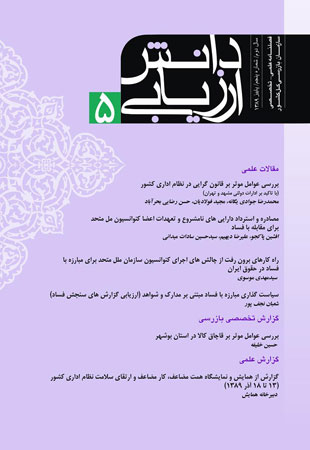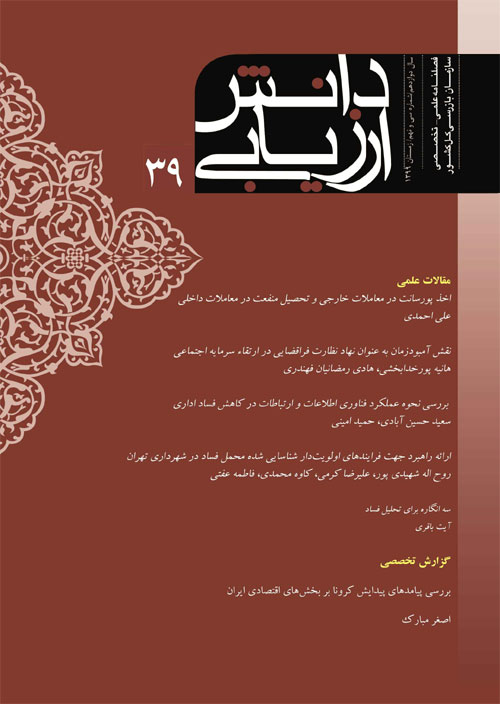فهرست مطالب

فصلنامه دانش ارزیابی
پیاپی 5 (پاییز 1389)
- تاریخ انتشار: 1389/09/20
- تعداد عناوین: 7
-
صفحه 5
- مقالات علمی
- گزارش تخصصی بازرسی
- گزارش علمی
-
Page 9According to international statistics and domestic researches Legalism in Iran is not in a high level. Officials confess that unwillingness to comply with law is high in Iran’s civil service and recognize it as being a major inconvenience. This article is intended to assess the extent of legality in civil service and at the same time, assess the factors which affect on legalism (willingness to comply with the law) in the country’s civil service. In this way, we will first construct a theoretical model based on Durkheim, Merton, Taylor’s theories and rational choice theory. Based on this model, the research hypotheses were constructed and then by using surveying method and questionnaire, we assessed the hypothesis. The research sample was “all of Tehran and Mashhad’s state offices”. At first, by using “judgmental sampling”, we chose 49 offices as the sample. Then, by ratio sampling, we selected 1238 civil servants, according to their echelon.According to results, multiple correlation coefficient is M.R=0.603 and coefficient of determination is R2=0/364. Adjusted coefficient of determination is 0.360. These figures show that nearly 36 per cent of variance and changes in the legality are determined by the variables in the equation. The existent figures verify that the variable of “binding organizational rules” with beta 0.370 more than any other independent variables directly affects legalism. The direction of the variable is positive and direct and shows that if organizational bindings increase, the extent of legalism will augment. Besides the variable of organizational binding rules, the variables of “trust”, “precedence of material issues in preferences system” and “nepotism feeling”, respectively
-
Page 35Confiscation and restitution of illicit assets is an important concern that from its beginning has been in the agenda of the United Nations relevant Convention and will be in it. However, there are some questions: which kind of commitments has been established by Convention; to which degree the members can act on these commitments; which kind of legislative and executive preconditions are concerned necessary; and if the current process of combat has a suitable speed. The main subject of this research is to find out some answers to these questions. To do so, we rely on librarian studies and the reports of Convention’s workshops. At the end, we try to offer some legislative and executive strategies.
-
Page 61The “United Nations Convention against Corruption” is considered as an effective step in fighting internationally against corruption phenomenon. The phenomenon, nowadays, has crossed borders and has become a global concern. Ratifying the Convention, Iran has joined the Convention’s members. Hence, it is essential to study different ways of collation between the Convention and Islamic Republic of Iran legal system and to find strategies for implementation of the Convention provisions in existing legal and regulatory gaps in order to converge them by laws and regulations. According to present classifications in Convention, study survey the different strategies to combat corruption; precautionary actions, guilty finding, implementing law and necessary actions to implement efficiently the Convention. Our aim is to find out how much laws are in accordance with Convention content, how can we eradicate the legislative deficits and offer necessary strategies and laws.
-
Page 101Outbreak of corruption could create a cycle in which corruption becomes highly prevalent in society. In this cycle, unscrupulous (or immoral) people are rewarded and honest people are weakened. As a result, the government’s legitimacy in the eyes of the public would be at risk. Therefore, corruption must be investigated and evaluated, not only because of being a moral issue (that is), and not just the traumas that imposes on business and economics (which is also open), but because of the people (especially in developing countries) who are forced to burden any corruption charges.Assessment of international documents and reports on corruption is one of the fields of study on corruption which seems go be important. Albeit some of these reports have a global reputation but even they are not free of problems and defects and it can be said that they have some basic computational and methodological bias. this paper will try to articulate the main limitations of the reports which attempted to measure corruption and especially Transparency International “Corruption Perception Index” (as a document on anti-corruption policy) from the perspective of policy-based evidence. The issues of false perceptions and the misplaced use of these indicators will be discussed too. The method of collecting information is documental studies and the used instrument is notes taking.
-
Page 131The aim of this survey is to “study the factors influencing goods smuggling in Boushehr Province”. Research hypotheses with regard to factors affecting smuggling were posed. These factors include: economic status of individuals, the performance of organizations associated with the smuggling, profitability, efficient level of existing laws against smuggling, tariff levels and tendency to consume the of smuggled goods.The research method is descriptive - survey. Statistical community includes “all shopkeepers and traders, officials and experts associated with the smuggling of goods such as police, customs, suspending department, inspection office, courts, intelligence office. .. and academic and education experts, and traffickers of goods in 1388.amounting to 26000 people finally, by use of proportionate and simple random sampling, the number of 370 (215 experts and officials, 95 shopkeepers and traders, and 60 smugglers) were selected. Data collection instrument is two researcher-made questionnaires. The first questionnaire was for officials and experts with 8 questions, The second questionnaire was for traders and good smugglers with 9 questions, Finally, the reliability coefficient of their attitudes gauge was 0/84 by using Cronbach’s alpha.Data analysis was performed on two levels: descriptive statistics (the mean, median, mode, variance, standard deviation, Kendall coefficient of agreement, percentage and frequency distribution table) and inferential statistics (Kalmogrof- Smirnov univariate test, HSD (Tukey), a univariate variance analysis, t-test of two dependent samples and univariate t).Results show that the attitudes of three groups (officials and experts, shopkeepers and traders, smugglers) based on economic status of individuals, the performance of organizations associated with the smuggling, profitability, efficiency of existing laws against smuggling, the customs tariffs of goods and the tendency to consume is moderate
-
Page 161In addition to practical activities to promote civil service safety and fight against corruption, one of the most important programs of “The Council of State Regulatory Agencies” is to held conferences and exhibitions to attract officials and Islamic state’s agents attention more than ever to the civil service safety and effective combat against corruption. In 1988, the council held a conference with the presence of senior officials and experts from universities and seminary. Efforts of researchers at the conference were published in a book entitled “Proceedings of the Conference on Promotion of Civil Service Safety” which was provided to the public. Given the relative success of this conference, the Council of State Regulatory Agencies decided due to the occasion of World Day to Combat Corruption and commemoration of double endeavor, double work, to hold a conference and exhibition on the performance of regulatory agencies and executive bodies in 1989.Presenting more than 170 scientific papers by experts, participation of officials and policy makers and the wide presence of audience, were the evidence of an enthusiastic welcome from practitioners and researchers of the field to the conference. Also, an exhibition was held of achievements, activities and programs of executive bodies in the field of promotion civil service safety; active bodies were introduced and a summary of their performance was presented by relevant authorities.This article is a summary of report on the ‘double endeavor, double work and promotion of civil service safety’ conference and exhibition to high, at the level of p≤0/05 and influential on good smuggling in Boushehr Province. Viewpoint of three groups (experts and officials, shopkeepers and traders, smugglers) about the performance of related organizations, effectiveness of existing laws to combat smuggling and tendency to use smuggled goods at the level of p≤0/05 are significant and different but their view about the impact of tariffs on smuggling are not significant and is the same at the level of p≤0/05.


